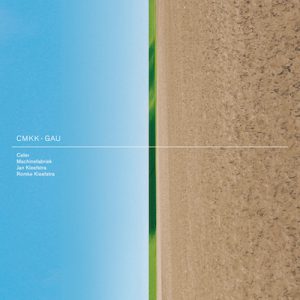Climbing Formation is a four-track album by Tokyo-based Ambient luminary Celer aka Will Long, comprising of eleven concatenations – or rather formations – realized via an organ, a synthesizer and various tape loops and movements. Released on the Parisian Entropy Records in mid-September of 2013, the CD comes in an edition of 500 deluxe matte-colored digipaks and with a limited postcard. It can be ordered directly from Entropy Records and is fully streamable at Will Long’s Bandcamp site. As with all of Celer’s releases, the artist creates a textual backdrop which could be coined as a cheeky faux-clarity; it seems to explain everything one ought to know about the respective work, but is abstract enough to not be served on a silver platter. Climbing Formation is no different in this regard and is potentially easy to understand due to the explanatory notes and the front artwork. Not entirely coincidentally, the unison of front artwork, album title and accompanying text offers the first designed dissonance. Climbing Formation is usually connected to rock climbing and the ascent of said formation, but the front artwork does not show illustrate the flimsiest barrow. It is a US Air Force jet that is shown, probably photographed in motion. The liner notes absorb – and rigidify – the leitmotif of aeronautics: two different travelogs are contrasted, the first written by one William A. Long, Jr. in Fairbanks, November 1960 while being on a plane in order to “oversee a polar station in the middle of nowhere.” Whether this is a relative of Will Long or a namesake is not revealed (yellow press anyone?). The second travelog is written by Celer himself during a flight to Tokyo as he lets his mind drift: “I keep watching out the window, continually sucked into the sunset, and the distant mountains of clouds hanging over the ocean.” Mountains and airplanes are thus the main theme of the album, but the reviewer’s prerogative of interpretation is still in danger as the unfolding arrangements show. The specific qualities and textural components are further carved out below. For now, it should be enough to know that Climbing Formation is a potentially joyous glorification of natural surroundings which steer our thoughts like coxswains from afar. But how does this explain the scattered arcana and paroxysmal mysteries?
The first track encapsulates three vignettes and runs for over 22 minutes, enough time for Will Long to fathom out the positively etiolated plateaus in vertiginous heights. The opening segment Motions That Vary Due To Height showcases two particular characteristic traits of Celer’s music which are reoccurring frequently as of late. The first attribute is an almost peculiarly prolonged fade-in phase. The Tokyoite has all the time in the world and lets the listener notice exactly that. The second remarkable feature is based on the overall volume level. Quiet and decidedly thinned retro runlets become ameliorated with unexpectedly weighty bass drones and cautiously seraphic synth washes which remain closely attached to the warm analogue sound of the faintly piercing alloy. In what could be the second section called The Overhead Emptiness, the formerly whispering synth spheroids now seem augmented and much louder, emitting a braiding of aerose cloudlets, with the beguiling abyssal bass still intact, now fluttering in a rotor-resembling way. Despite the constant heterodyning and purposeful setbacks architecture-wise, this polyhedric part is undoubtedly moving forward and yet depicts the glorification of the occasional doldrums. More nostalgic rather than melancholic, the blue-tinted timbre of the vitreous clarity figuratively alleviates and softens every mental leap. The simultaneity of the sylphlike bass flumes and the crystalline translucency of the synths make the whole track a New Age-oid but less histrionic piece of utter contemplation. But where does the last part named Being Closer To The Sun truly start? It could embody the emaciated fade-out phase sans bass. But ever since my review of Celer’s Viewpoint (Murmur Records, 2013) which suggests 26 different movements during one track of 78+ minutes despite the constant reintroduction of former elements and tone sequences, I hope to know better; the whole track shall be seen and interpreted as one outcome, with the track titles being either Will Long’s own or the listening subject’s temporary, highly fugacious thoughts which are slightly driven by the fluxion instead of explaining the music itself.
The second track does not impose such issues on the listener, as it is the only piece that stands on its own feet. Or so it seems. Called Fires That Light Up The Night, it naturally integrates well with the endemic atmosphere, but also revs up the feelings of tension and nervousness which were heretofore only flimsily implied and cautiously hinted at. Now the flurry is all the more astonishing; frosty static noise-infused bell layers are scything back and forth, mimicking the movement of billows. The nocturnal hint of the title really does come into play, for these iridescent but glacial glitters are not as fervid as the titular fires might suggest. The interstitial structure of the track is noteworthy: darkness is indeed all around the listener or the plane, there are no melodic patterns, not even synth tendrils. Bass undulations with those glistening whitecaps are all there ever is. On higher volume levels, the crepuscular twilight is partially illumined by virtually invisible synth gases which diffuse and gyrate around the bass-heavy formations. Fir-green in their tonality, ultraviolet for the eye, they interpolate the arcanum and function as the enigmatic friction. It is a curious remark to suggest turning up the volume when Will Long decides to present fragile movements, but only then is one able to imbibe the hidden undertones and push the otherwise desiccate embellishments into the limelight. The sheer force of the bass might be overwhelming even in neutral amplifier configurations, but the dun-colored molecules behind the liquedous veils offer enlightenment in an arrangement which seems to favor atrophy and putrefaction.
The third climbing formation runs for 19+ minutes and is pieced together by three vignettes. It also sports the most beatific title, for the opening section is named Strong, Exhilarating Effects. If someone told me this was an outtake of Tetsu Inoue’s final bequest Inland (2007), I would have believed it without a shadow of a doubt. Celer’s Ambient piece is again coated in tension, but this time it is pleasant anticipation… presented in technicolor. Elasticized and fluttering synth prongs, Japanese tonalities, the mercilessly hammering staccato of the thankfully enormously softened bassline as well as the spheroidal susurration of the mauve-tinted globs of light altogether create a saturated complexion of thermal fogginess. The synchronism of the layers fortifies the impetus, everything feels erudite, seducing, purified and aquiver with pleasure. Yearly Delta follows after approximately ten minutes – at least that is how I perceive it – and neglects the overabundance of the opening segment in favor of a more whitewashed, distantly stolid approach, but with a similar allure. The synth movements swirl in the distance, but influxes and vestibules allow them to ooze into the foreground. The disposition is inexplicit: the movement borrows the surfaces and patterns from Strong, Exhilarating Effects, but decreases the contrast and lets grayness into the bubbling bass-infested superimposition. There is a third track hidden in here, Autopilot, but it is hard to precisely name its infancy stage, as it seems to be nonexistent. It conflates with the mood range and could have been there all along. That is the boon of an autopilot: invisible and magical to the layman, but fit for service when the professional needs it.
The finale rests upon a long-winded four-part apotheosis and rounds off the album with another mélange of potentially threnodic but rather turbulent constructions, turbulent of course only in the given set of intrinsic rules and textures. Weak Hillsides does actually feature a tumular physiognomy (Oldfield fans, read that again: tu-mu-lar). Similar to the wave movements in the second track Fires That Light Up The Night, it is as if Celer flew above the Chocolate Hills of Bohol. One can even sense the body of the airplane and the droning of its machines and engines. The ebb-and-flow fabric is intensified by various rumbling bass protrusions and the cosmically coruscating coils which are severely attached to the wave-like nature. Once the respective apex falls down, so does the synthetic moiré around it. Resignation Tendency is the second aural subheading, but again, do not ask me where it starts. It could end after about 16 minutes though, for I link the title of the third track Hot Tower to that specifically dazzling ardor which unfolds around this mark. The tone sequences of the former two tracks are resurrected, but camouflaged, blurred and diluted, now shimmering from afar, fulfilling the service as interim backdrops in close proximity to walls of low frequency warmth. It is either here on Hot Tower or the cross-fading and immeasurably resemblant last call Free Daydream where Will Long presents another one of his trademarks, and not a minute too late as the adage goes: piercing sine tones. They are neither aggressive-alkaline nor brazen-metallic, but much more present and self-confident. The quartet of tracks ends with a magnanimous fade-out phase and the calcined state of all emotions. The daydream may restart and build up these emotions anew.
Why Will Long eventually neglected the plural of the titular formation is not known to me, but factually, Climbing Formation is pieced together by multitudinous circular clefts, promontory protuberances and tramontane tectonics which are watched from afar, with the airfoil or wing always in sight. This is still no kaleidoscopic piece rather than a funneled artifact where a certain set of textures is poured into the contours and outlines. The outer hull of the airplane is always physically apparent. Yes, I do indeed refer to the tactile sense, as the droning bass is often overwhelmingly present and upfront, resembling the droning engine sound that is so archetypical for passenger planes. It does not need the front artwork, let alone a genius to pinpoint the plane’s omnipresence as a quasi-fragile piece of shelter: track titles such as Autopilot and Motions That Vary Due To Height speak for themselves. Technically, they are not real track titles rather than poignant formations of Will Long’s observations and reasonings. While the aforementioned Viewpoint featured 26 movements in a gigantic track of 78+ minutes, the eleven vignettes in four tracks are comparably tame and transparently opalescent. Appearances are deceiving, Celer prefers his herring the red way, and it may well be that the sub-tracks are not at all attached to a certain intersection rather than a specific observation which is not necessarily transcoded in the piece via enlightening tone sequences or specific timbres. This would explain why there are often more sub-tracks than there are definable progressions. Overall, the applied surfaces show typical Celerisms such as the entanglement of strongly pristine-purified New Age vestiges in the shape of crystalline synths with their jagged semi-incisive organ spirals. Both aortas are then perfected by abyssal yet snugly bass pipes and waterways. This textural triptych maintains, fuels and kindles the whole album; no field recording or spoken word sample is presented, at least not in an audible, clear cut form. The whole album is magnificently pensive and stupendously efficient during work-related tasks at one’s desk, with its third track being eminently saturated and imbibing. One final advice, whether it reduces the driving factor of Climbing Formation or not: crank up the volume! You will be rewarded with belly-massaging bass drones and super-crystalline synth cascades without bringing the positively tranquil ambience to naught.
Link

